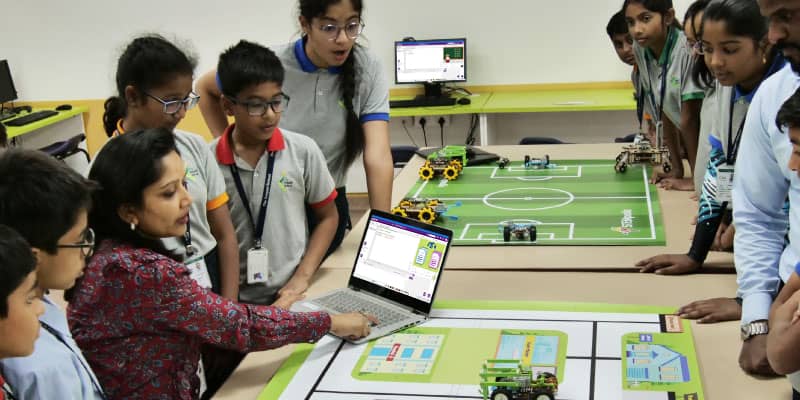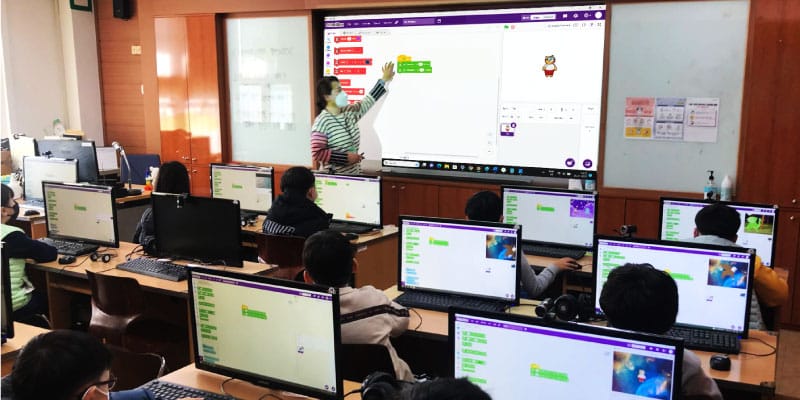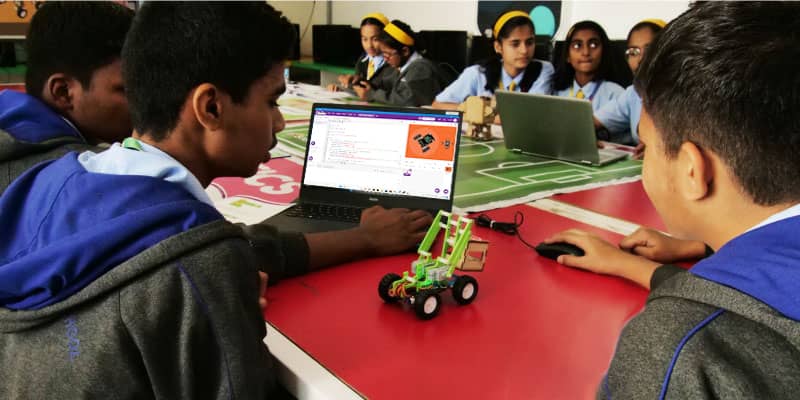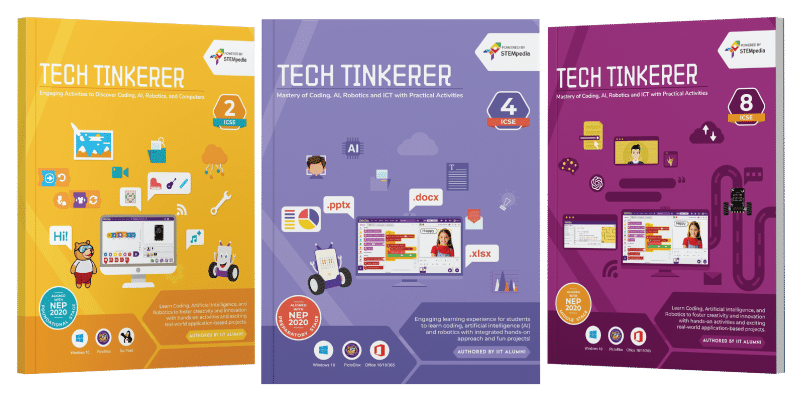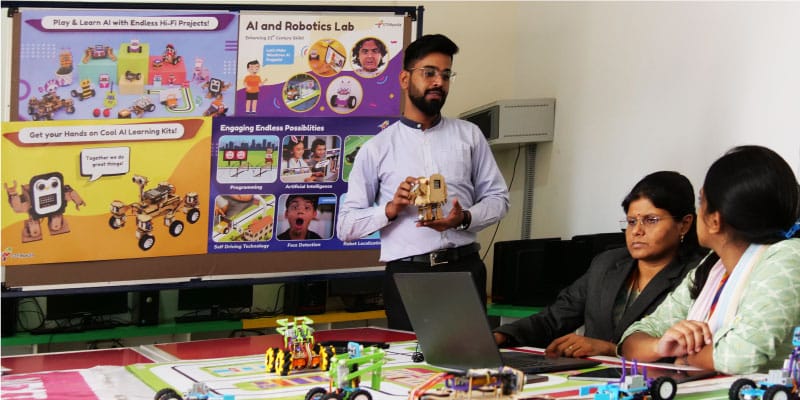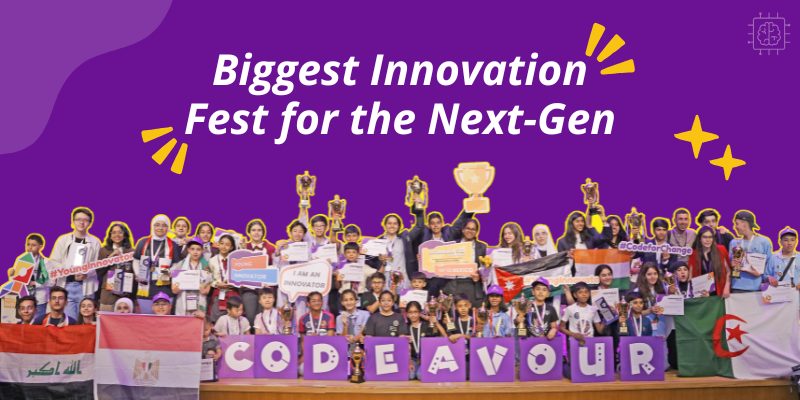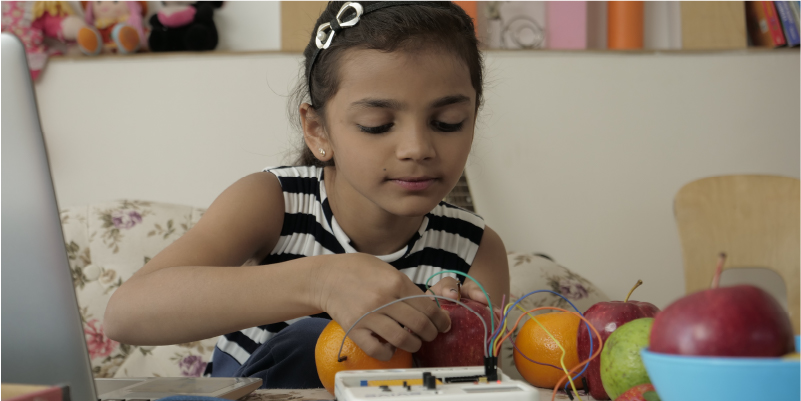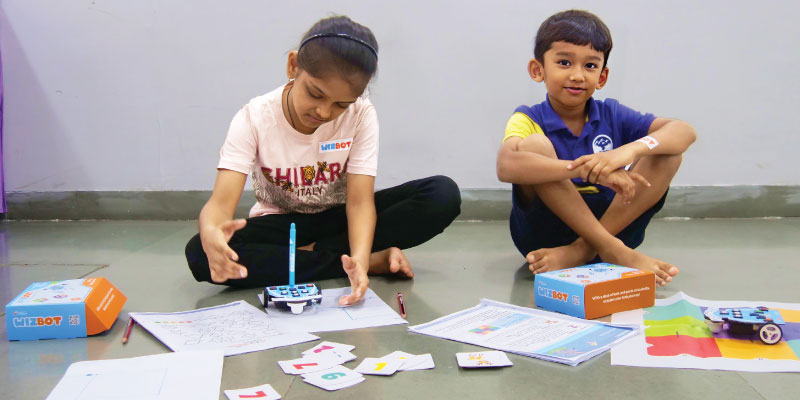“New technologies are impacting consumer consumption and driving technological innovations in digital media, so if you want to remain relevant you must become comfortable with the ever-changing creative process.”
Germany Kent
Everyone will completely agree with the essence of the quote. Technology has revolutionized human life and it’s time to cultivate practical skills in future generations.
Considering the growing demand for emerging technologies, it is excellent news that the Council for Indian School Certificate Examinations (CISCE) is adding Robotics and Artificial Intelligence as new subjects in ICSE and ISC curricula, allowing students to create robots, automate tasks, and solve complex problems with data analysis.
This blog highlights the significance of including coding, AI, robotics, machine learning, and data science in the ICSE curriculum. We’ll also discuss how STEMpedia can provide quality lab facilities to ICSE schools for practical learning.
Importance of Teaching Coding, AI, and Robotics to Students
In today’s fast-paced world, it is essential to prepare students for the future. This is where teaching coding, artificial intelligence, robotics, machine learning, and data science come in. These fields are becoming increasingly important and can give students a significant advantage in the job market.
Here are some key reasons why getting hands on these technologies is so crucial:
- Preparing students for the future job market: As technology advances, it’s becoming increasingly important for students to have a strong foundation in coding, artificial intelligence, robotics, machine learning, and data science. These skills are in high demand in the job market, and students who are proficient in them will have a significant advantage in securing employment in the future.
- Enhancing critical thinking skills: Coding, artificial intelligence, robotics, machine learning, and data science require students to think critically and logically. By learning these skills, students will develop problem-solving abilities, analytical skills, and the ability to evaluate data and make informed decisions. These skills are valuable not only in the technology industry but in all fields.
- Fostering creativity and innovation: By learning to code and work with technologies like artificial intelligence and robotics, students can explore their creativity and bring their ideas to life. They can build and experiment with new technologies, develop new applications, and find innovative solutions to problems.
- Enabling data-driven decision making: Data is everywhere, and by learning data science, students will be able to analyze, interpret and use data to make informed decisions. This skillset is becoming increasingly important in all fields and industries.
- Employability skills: Learning coding, artificial intelligence, robotics, machine learning, and data science can provide students with a wide range of employability skills, including teamwork, communication, and project management. These skills are highly valued by employers and can help students succeed in their careers.
ICSE board Robotics and AI curriculum (Subject Code 66)
So, we are not shooting in the dark. It’s not us but the Council for Indian School Certificate Examinations (CISCE) that has formulated this plan. Let’s know about the key announcement notes of CISCE:
- CISCE has introduced technology-based courses like Robotics, AI, ML, and data science in the curriculum for Class IX students who will take their ICSE exams in 2025.
- New courses will be introduced gradually from 2023-24 academic session to help students adapt to the changing curriculum and develop critical thinking skills.
- The council has partnered with IIT Delhi to introduce advanced courses aligned with current educational needs. They’re also providing online and offline training to teachers on innovative evaluation techniques.
- The council’s efforts align with the National Education Policies focus on holistic student development and comprehensive evaluation.
Now let’s talk about Subject Code 66 designed for Robotics and Artificial Intelligence of the ICSE curriculum.
The Council for the Indian School Certificate Examinations (CISCE) has added Robotics and Artificial Intelligence (Subject Code 66) to the ICSE and ISC curricula for Classes IX to XII from 2023 academic year. The first exams for these subjects will be held in 2025 for ICSE (classes 9th and 10th) and 2026 for ISC (classes 11th and 12th). The course provides a thorough understanding of Robotics and AI concepts, develops competencies through hands-on learning, and equips students with AI-Readiness skills and ethical considerations awareness.
Syllabus of ICSE Robotics and AI
The I-Hub Foundation for Cobotics (IHFC) at IIT Delhi will curate the syllabus for the CISCE board, introducing 21st-century skills and aspects of the National Education Policy (NEP) 2020 to students in over 2,700 affiliated schools. The initiative will introduce robotics and artificial intelligence courses at the ICSE and ISC levels, covering robot design, programming, and AI fundamentals such as machine learning and big data analytics.
ICSE Robotics and AI Syllabus for Class IX
CISCE’s new ISCE Robotics and AI Syllabus (subject code 66) for class IX has been divided into two sections.
Syllabus of Robotics for ICSE class IX includes:
- Introduction to Robotics (Understanding Robotics, Evolution of Robots; Laws of Robotics, Classification of Robots)
- Robot as a System (Building blocks of Robots, Identification of Robots)
- Concepts in Robotics (Types of motion, Using links and joints to create specific motion, Degree of freedom of a robot)
Syllabus of Artificial Intelligence for ICSE class IX includes:
- Introduction to Artificial Intelligence (Meaning and brief history, Applications and Benefits of AI, Ethical considerations in AI)
- Role of Data and Information, Evolution of Computing (Data and Information, Evolution of Computing)
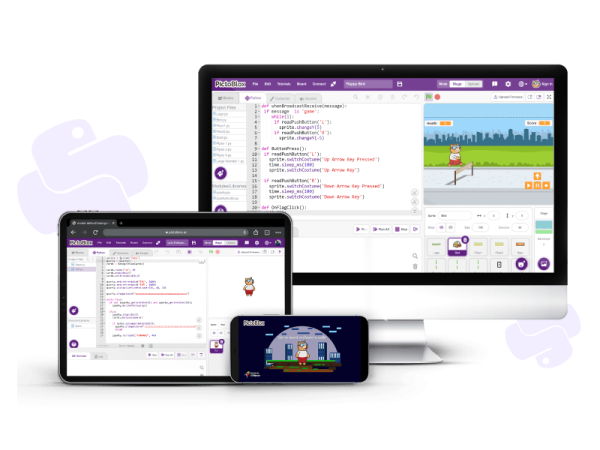
- Introduction to Data and Programming with Python (Familiarization with Python, Introduction to data types and variable, Introduction to Operators, Conditional Statement, Control Statements, Functions)
- AI Concepts and AI Project Framework (AI Concepts, Components and Stages (alias AI Project Cycle))
You can read about the detailed ICSE Robotics and Artificial Intelligence (Subject Code 66) syllabus here.
ICSE Robotics and AI Syllabus for Class X
ISCE Robotics and AI Syllabus (subject code 66) for class X has two main categories:
Syllabus of Robotics for ICSE class X includes:
- New Age Robotic Systems (Warehouse Robots, Assistant Robots, Smart Homes, Smart Schools, Smart mobility, Autonomous Cars/Driver Assisted Cars, Autonomous Drones, Robotics for Medicine and Healthcare)
- From Robots to Cobots (Difference between a machine and a robot, Introduction to cobots)
- Components of Robots as a System (Introduction to Gears, Sensors in Robotics, Actuators, Controller for a Robotic System, Integrating Sensors, Actuators and Controller in a Robotic System)
- Visualization, Design and Creation of Components (Application of Mechanical Block of Robotics, Visualization of motion)
- Integrating Robots as a System (Building simple robotic systems, wheeled mobile robot, Single Board Computer coding)
Syllabus of Artificial Intelligence for ICSE class X includes:
- Decision making in Machines/ Computers (Automated versus Autonomous Systems, Decision Making, Machine Learning)
- Machine Intelligence and Cybersecurity in Computing (Machine Intelligence – Turing Test, Cybersecurity)
- Components of AI Project Framework (Problem Scoping, Data Acquisition, Data Exploration, Modelling and Evaluation)
- Introduction to Data and Programming with Python (Modules and Packages, Lists and Tuples in Python, Strings)
Assessment for Robotics and AI Subject for ICSE Class X
The assessment for Robotics and Artificial Intelligence in ICSE has two parts: internal marking (100 marks) based on 20 assignments, and a theory paper (100 marks) covering the syllabus. Robotics and AI assignments carry 3 marks, while Python programming assignments carry 15. The theory paper must be completed in two hours.
Hardware Requirements for Teaching Robotics and Artificial Intelligence in ICSE
Understanding the current education scenario, the ICSE has launched an initiative to integrate Robotics and AI into their curriculum under the ICSE skill hub initiative. This move aims to prepare students for future technological advancements by providing hands-on experience with cutting-edge technologies. To support this educational endeavor, ICSE specifies certain hardware requirements essential for Robotics and Artificial Intelligence education. These requirements ensure that students gain practical experience in building and programming robots.
For teaching AI and robotics to a class of 30 students, the Council for the Indian School Certificate Examinations (CISCE) recommends using single-board computers. Following the guidelines set by CISCE, STEMpedia has developed an innovative approach to meet these educational needs.
We have introduced single-board computers such as Arduino and Raspberry Pi or equivalent micro-controllers like Quarky, which are compatible with all necessary robotics components. These components include servo motors, sensors, wires, batteries, and LEDs, ensuring a rich hands-on learning experience. The hardware and robots are required to be compatible with Python programming, thus facilitating an effective learning environment. Quarky, in particular, is highlighted for its full compatibility with these components and Python, making it an ideal choice for creating a comprehensive and effective learning tool for students.
This strategic approach by STEMpedia, aligned with ICSE’s requirements, aims to foster a deep understanding of Robotics and Artificial Intelligence among students, equipping them with the skills needed to navigate the technological landscapes of the future.
Structured Curriculum with Practical Activity books aligned with Subject Code 66
STEMpedia offers an exclusive AI and robotics curriculum for ICSE students. The Tech Tinkerer Program, aligning with NEP 2020 and NCF 2023, transforms technology education for classes 1 to 8. It blends the ICSE curriculum with AI, robotics, and coding (ICSE Skill Subject Code 66). Students and teachers develop essential 21st-century skills with hands-on AI lab activities. The focus is on activity-based learning with real-world applications that turn traditional computer labs into innovative learning hubs.
We also provide a grade-wise year-long Robotics and AI curriculum for ICSE students, based on NEP 2020 and ICSE’s skill subjects. It includes AI courses, practical Activity books, and resources for project-based learning. For classes 3rd to 8th, it teaches fundamental Robotics and AI concepts. The 9th and 10th textbooks cover the complete Robotics and AI syllabus proposed by CICSE, offering an in-depth understanding through hands-on activities.
STEMpedia’s AI and Robotics Lab for ICSE Schools
If you are an ICSE school looking to incorporate these subjects into your curriculum, you might be wondering where to begin. That’s where STEMpedia AI and Robotics Lab comes into the picture.
Imagine your students having the opportunity to design and build their robots, write code to automate tasks, and use machine learning algorithms to analyze data. STEMpedia labs are equipped with cutting-edge technology and resources to make this possible.
STEMpedia’s AI and Robotics lab is a complete ecosystem to foster learning, creativity, and innovation in Coding, AI, and Robotics. It is a complete solution that offers a certified curriculum for grades 3 to 12, aligned with the ICSE Subject Code 66, DIY Robotics kits, Coding Software, Teaching Resources, and Learning Management Systems to impart the BEST coding, AI, and robotics education with hands-on learning.
-
Coding and AI Platform: PictoBlox
Pictoblox is a Block-based & Python coding software available across all platforms, from smartphones to laptops, that brings hardware-interfacing and AI-learning to your fingertips. It empowers students to make interactive animations and games, program actions for robots, build AI projects with ML and AR/VR environment, create interesting projects based on IoT, and much more!
-
DIY AI and Robotics Kit: Quarky
Quarky is a super fun AI companion that helps in learning new technologies like artificial intelligence and robotics in an engaging and enjoyable way. Kids can create a variety of projects like self-driving car, pick and place robot, walking robots, IoT house and gardening system and much more using Quarky and its DIY kits which prepare students for the future.
-
Teacher Development Programs
To overcome any barrier between new reasonable AI and Robotics ideas and old traditional education system, training the teachers on these new technology is significant. STEMpedia equip computer science teachers, STEM faculty, and school IT staff with the necessary skills through master AI trainers. STEMpedia conducts on-site capacity building program to ensure that teachers receive dedicated upskilling opportunities.
-
Learning Management System
Teachers can access to all the teaching material, lesson plans and presentations, activity sheets, and learning resources. It also facilitates student progress assessment by providing resources for tracking and analyzing student performance.
-
Innovation Festival and International Coding Competition
The school innovation festival is a uniquely designed in-school event to showcase all projects and inventions developed by students, they are also provided with the opportunity to showcase their learning and talent in Codeavour – The Biggest AI and Coding Competition for Kids. The coding competition allow students to ignite the passion for technology where they compete with the kids across globe while gaining exposure.
-
Year-long Support and Service Plan
STEMpedia provides the Annual maintenance and 12-month warranty on equipment of AI and Robotics Lab and regular teacher upskilling and doubt solving sessions for efficient functioning of Lab.
In a Nutshell
ICSE has introduced Robotics and AI in their curriculum to prepare students for the 21st Century’s digital demand, by providing your students with access to our AI and Robotics Labs, you are setting them up for success in the digital age. STEMpedia’s AI and Robotics Lab are align with the ICSE board’s guidelines and provide structured modules that cover topics such as coding, AI, robotics, ML, and data science. These modules can be integrated into existing courses or taught as standalone subjects. Contact us today to learn more about how we can help your ICSE school incorporate coding, AI, robotics, ML, and data science into your curriculum.

